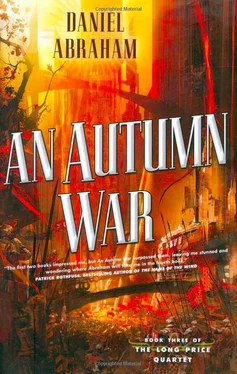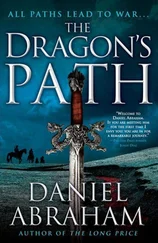Daniel Abraham - Autumn War
Здесь есть возможность читать онлайн «Daniel Abraham - Autumn War» весь текст электронной книги совершенно бесплатно (целиком полную версию без сокращений). В некоторых случаях можно слушать аудио, скачать через торрент в формате fb2 и присутствует краткое содержание. Жанр: Фэнтези, на английском языке. Описание произведения, (предисловие) а так же отзывы посетителей доступны на портале библиотеки ЛибКат.
- Название:Autumn War
- Автор:
- Жанр:
- Год:неизвестен
- ISBN:нет данных
- Рейтинг книги:4 / 5. Голосов: 1
-
Избранное:Добавить в избранное
- Отзывы:
-
Ваша оценка:
- 80
- 1
- 2
- 3
- 4
- 5
Autumn War: краткое содержание, описание и аннотация
Предлагаем к чтению аннотацию, описание, краткое содержание или предисловие (зависит от того, что написал сам автор книги «Autumn War»). Если вы не нашли необходимую информацию о книге — напишите в комментариях, мы постараемся отыскать её.
Autumn War — читать онлайн бесплатно полную книгу (весь текст) целиком
Ниже представлен текст книги, разбитый по страницам. Система сохранения места последней прочитанной страницы, позволяет с удобством читать онлайн бесплатно книгу «Autumn War», без необходимости каждый раз заново искать на чём Вы остановились. Поставьте закладку, и сможете в любой момент перейти на страницу, на которой закончили чтение.
Интервал:
Закладка:
"I can offer to kill all their crops," Maati said, writing Heshai-ko at the top of the second column. "I can threaten to make every cow and pig and lamb barren. I can make every Galtic woman who's bearing a child lose it. Faced with that, they'll turn hack."
His stylus paused over the head of the third column, and then he wrote his own name. He and Cehmai could outline the major points here; they could add and remove aspects of Heshai's first vision, interpret the corrections the old poet would have made, had he been given the chance. They could remake the binding, because the binding was already half-remade. If there was time. If they could find a way. If they were clever enough to save the world from the armies of Galt.
"And if they don't turn hack?" Cehmai said.
"Then we'll all die. Their cities and ours. Check to see if that tea's ready to brew up, will you? I need your help with this, and it will go better if you're sober."
The Sculpture Garden of Cetani was the wonder of the city. Two bronze men in the dress of the Emperor's guard stood at the entrances at its Northwest end, staring to the south and east, as if still looking to the Empire they had failed to protect. In their great, inhuman shadows, the finest work of the cities of the Khaiem had been gathered over the span of generations. There were hundreds of them, each astounding in its own fashion, under the wide branches of ash and oak with leaves the color of gold. The dragons of Chaos writhed along one long wall, their scales shining with red lacquer and worked silver, chips of lapis and enamel white as milk. In a shadowed niche, Shian Sho, last of the Emperors, sat worked in white marble on a high dais, his head stink despairingly in his hands. It was a piece done after the Empire's fall. If the Emperor had seen himself shown with such little dignity, the sculptor would have been lucky to have a fast death. But the drape of the final Emperor's robes made the stone seem supple as linen, and the despair and thoughtfulness of the dead man's expression spoke of a time nine generations past when the world had torn itself apart. The sculptor who had found Shian Sho in this stone had lived through that time and had put the burden of his heart into this monument; this empty sepulcher for his age. Otah suspected that no man since then had looked upon it and understood. Not until now.
The Khai Cetani stood at the foot of a life-size bronze of a robed woman with eagle's wings rising wide-spread from her shoulders. He was younger than Otah by perhaps five years, gray only beginning to appear in his night-black hair. His gaze flickered over Otah, giving no sign of the thoughts behind his eyes. Otah felt a moment's selfconsciousness at his travel-worn robes and incipient, moth-eaten beard. He took a pose of greeting appropriate for two people of equal status and saw the Khai Cetani hesitate for a moment before returning it. It was likely it was the first time in years anyone had approached him with so little reverence.
"My counselors have told me of your suggestion, my good friend Nlachi," the Khai Cetani said. "I must say I was… surprised. You can't truly expect us to abandon Cetani without a fight."
"You'll lose," Otah said.
"We are a city of fifty thousand people. These invaders of yours are at most five."
`They're soldiers. They know what they're doing. You might slow them, but you won't stop them."
The Khai Cetani sat, crossing his legs. His smile was almost a sneer.
"You think because you failed, no one else can succeed?"
"I think if we had a season, perhaps two, to build an army, we might withstand them. Hire mercenaries to train the men, drill them, build walls around at least the inner reaches of the cities, and we might stand a chance. As it is, we don't. I've seen what they did to the village of the [tai-kvo. I've had reports from Yalakeht. Amnat-Tan will fall if it hasn't already. They will come here next. You have fifty thousand, including the infirm and the aged and children too young to hold a sword. You don't have weapons enough or armor or experience. My proposal is our best hope."
It was an argument he had wrestled with through many of the long nights of his journey to the North. Force of arms would not stop the Gaits. Slowing them, letting the winter come and protect them for the long, dark months in which no attacking force would survive the fields of ice and brutally cold nights, winning time for the poets to work a little miracle, bind one of the andat and save them all-it was a thin hope but it was the best they had. And slowly, during the days swaying on horseback and nights sitting by smoldering braziers, Otah had found the plan that he believed would win him this respite. Now If the Khai Cetani would simply see the need of it.
"If you bring your people to Machi, we will have twice as many people who can take the field against the Galts. And if you will do what I've suggested with the coal and food, the Galts will be much worse for the travel than we will he."
"And Cetani will fall without resistance. We will roll over like a soft quarter whore," the Khai Cetani said. "It's simple enough for you to sacrifice my city, isn't it?"
"None of this is easy. But simple? Yes, it's simple. Bring your people to Machi. Bring all the food you can carry and burn what you can't. Mix hard coal in with the soft, so that what we leave behind for the (; alts will burn too hot in their steam wagons, and give me the loan of five hundred of your best men. I'll give you a winter and the library of Machi. Between your poet and the two at my court-"
"I have no poet."
Otah took a pose of query.
"Ile died half a month ago, trying to regain his andat," the Khai Cetani said. "His skin went black as a new bruise and his bones all shattered. I have no poet. All I have is a city, and I won't give it away for nothing!"
The Khai Cetani's words ended in a shout. His face was red with fury. And with fear. There was no more that Otah could say now that would sway him, but years in the gentleman's trade had taught Otah something about negotiations that the Khaiem had never known. lie nodded and took a pose that formally withdrew him from the conversation.
"You and your men will stay here," the Khai Cetani said, continuing to speak despite Otah's gesture. "We will make our stand here, at Cetani. We will not fall."
"You will," Otah said. "And my men will leave in the morning, with me.
The Khai Cetani was breathing fast, as if he had run a race. Otah took a pose of farewell, then turned and strode from the garden. To the east, clouds darkened the horizon. The scent of coming rain touched the air. Otah's armsmen and servants fell in with him. The eyes of Cetani's utkhaiem were on the little procession as Otah walked to the apartments granted him by the Khai. He was a curiosity-one of the Khaiem walking with the swagger of a man who'd sat too long on a horse, his retinue looking more like a mercenary captain's crew than courtiers. And Otah suspected that martial air, however undeserved, would serve him. He scowled the way he imagined Sinja might have in his place.
Ashua Radaani was sitting at the fire grate deep in conversation with Saya the blacksmith when Otah entered the wide hall that served as the center of the visitors' palace. Battle and loss and the common enemy of Galt had mixed with the shared recognition of competence to make the two men something like friends. They stood and took poses of respect and welcome that Otah waved away. He sat on a low cushion by the fire and sent his servant boy to find them tea and something to eat.
"It didn't go well, I take it," Radaani said.
"It didn't go well and it didn't go badly," Otah said. "He's smart enough to be frightened. "That's good. I was afraid he'd be certain of himself. But his poet's dead. "Tried to recapture his andat and paid its price."
Читать дальшеИнтервал:
Закладка:
Похожие книги на «Autumn War»
Представляем Вашему вниманию похожие книги на «Autumn War» списком для выбора. Мы отобрали схожую по названию и смыслу литературу в надежде предоставить читателям больше вариантов отыскать новые, интересные, ещё непрочитанные произведения.
Обсуждение, отзывы о книге «Autumn War» и просто собственные мнения читателей. Оставьте ваши комментарии, напишите, что Вы думаете о произведении, его смысле или главных героях. Укажите что конкретно понравилось, а что нет, и почему Вы так считаете.










